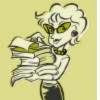 Yolen, Jane. Raul Colón. (Ill.) 2003. MIGHTIER THAN THE SWORD: WORLD FOLKTALES FOR STRONG BOYS. New York: Harcourt. ISBN 0-15-216391-3
Yolen, Jane. Raul Colón. (Ill.) 2003. MIGHTIER THAN THE SWORD: WORLD FOLKTALES FOR STRONG BOYS. New York: Harcourt. ISBN 0-15-216391-3“Hero is about being clever, learning from your mistakes, being kind and compassionate, and finding good friends.” (p. ix) In a preface, Jane Yolen writes an open letter to her sons and grandsons explaining why she has collected and retold these folktales. In this fresh approach to traditional stories, the reader finds him or herself in the midst of heroes who use their brains rather than brawn to triumph. Each vignette is accompanied by a moral and a black and white drawing. In addition, the country of origin is noted. MIGHTIER THAN THE SWORD includes folktales such as beast tales and fairy tales. The characters include anthropomorphized animals and the plots are formulaic and full of action. For example in Jake and His Companions, a boy, donkey, dog, cat and rooster seek their fortune. En route, they take on a band of thieves. When Jack and his friends overcome six ruffians, albeit in an unlikely manner, the reader is nonetheless satisfied. This collection also includes fables such as Knee-High Man. After talking with several animals about his petite stature, Knee-High Man learns it is more important to have a big brain than a big body. This story has a moral, talking animals and brevity—all typical ingredients for a fable. Yolen takes care to use culturally specific words in the different stories. In the African-American tale, the term brother is used to mean friend; the Norwegian tale has a character named Ole; and the Angolan story refers to the river Lukala which runs through the capital city Kwanza Norte. Some recognition of cultures may be seen in the illustrations as well. Adding to this collection’s value are the Table of Contents and Notes on the Stories sections.
Providing many opportunities to tout brains over brawn, this collection of folktales is recommended for readers ages 8-12 years.

No comments:
Post a Comment